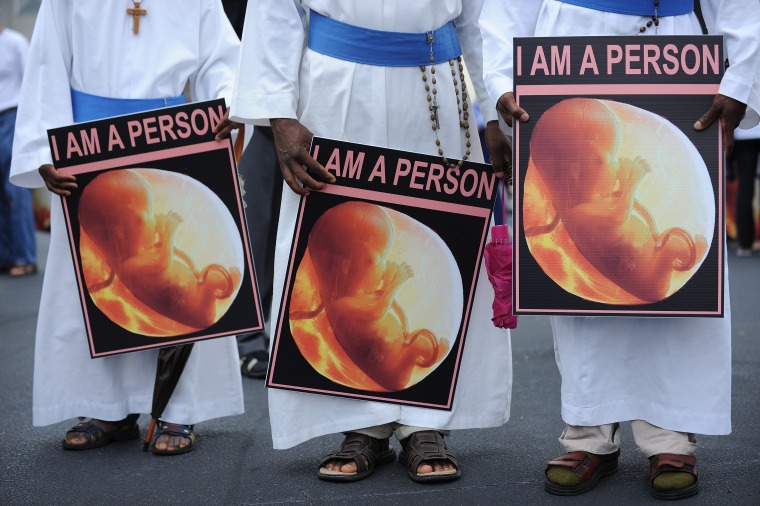In a major legal victory for abortion rights, a federal appeals court has struck down a North Carolina abortion restriction that forces patients to view and hear a description of the fetus — even if they were rape survivors, and even if they covered their eyes and ears.
The unanimous decision, written by 4th Circuit Court of Appeals Judge J. Harvie Wilkinson, was particularly notable for how it robustly pushed back at the law on First Amendment grounds.
"The Requirement is quintessential compelled speech," Wilkinson, a Reagan appointee, wrote. "It forces physicians to say things they otherwise would not say. Moreover, the statement compelled here is ideological; it conveys a particular opinion."
RELATED: Supreme Court punts on abortion
Potential violations of the First Amendment can be subject to a much higher bar than other laws are, but a similar First Amendment argument failed in Texas, where the 5th Circuit Court of Appeals allowed that state's forced ultrasound law to go into effect. North Carolina argued in defending the law that it should be subject to an even lower standard than abortion restrictions generally are — rational basis, meaning it wouldn't even have to justify why the law is medically necessary.
The First Amendment also presents a strategic argument on the part of the abortion clinics in the case. The Roberts Court has been notably more open to First Amendment arguments on a range of issues. At the same time, lower federal courts have taken the vague, existing legal standard for abortion — whether a law poses an "undue burden" on an abortion patient — and decided it means whatever they want it to mean.
"Far from promoting the psychological health of women, this requirement risks the infliction of psychological harm on the woman who chooses not to receive this information."'
The North Carolina law was passed in July 2011 despite a gubernatorial veto. Whereas the Texas version of the law had exceptions for rape, incest and fetal anomaly, the North Carolina version only waives the ultrasound requirement in cases of medical emergency.
Wilkinson wrote that the state does indeed have the right to regulate the medical profession, but "that does not mean that individuals simply abandon their First Amendment rights when they commence practicing a profession." He also focused on the circumstances in which the so-called "informed consent" takes place.
"Far from promoting the psychological health of women, this requirement risks the infliction of psychological harm on the woman who chooses not to receive this information," Wilkinson wrote. "She must endure the embarrassing spectacle of averting her eyes and covering her ears while her physician— a person to whom she should be encouraged to listen — recites information to her. We can perceive no benefit to state interests from walling off patients and physicians in a manner antithetical to the very communication that lies at the heart of the informed consent process."
RELATED: What reopening a Texas abortion clinic meant to one woman
North Carolina has not yet said whether it will appeal to the Supreme Court. It can also ask for a re-hearing with the full 4th Circuit Court of Appeals.
The decision goes into detail about how these judges' analysis differs from that of other circuits courts, including the 5th and 8th Circuits. That could serve as a possible invitation for the U.S. Supreme Court to step in. In November 2013, the Supreme Court declined to hear an appeal from Oklahoma after its state Supreme Court asked it to reinstate its own ultrasound-before-abortion law.
For now, pro-choice advocates are celebrating. Said Bebe Anderson, vice president of the U.S. legal program at the Center for Reproductive Rights, which represented clinics in the case, "The court has looked beyond the sham pretense of this law."
